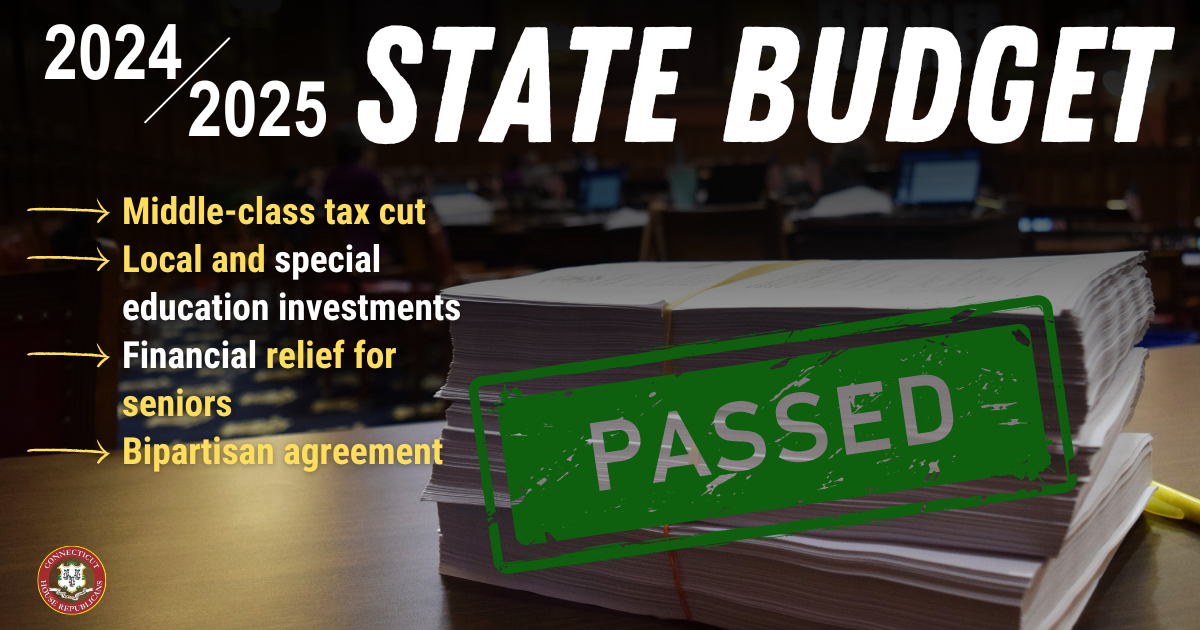Rep. McGorty Votes to Adopt 2024-25 Connecticut State Budget with Historic Income Tax Cut

Posted on June 6, 2023
HARTFORD – On Tuesday, State Rep. Ben McGorty (R-122) voted to adopt the FY 2024-2025 Connecticut state budget, headlined by a historic cut to the state income tax for middle- and low-income earners and families.
The fully balanced bipartisan budget features more than $150 million for local education, investments in public safety, strict adherence to fiscal guardrails established in the 2017 budget agreement, and establishes a phase-out on pension and annuity taxes. Each of these key initiatives were proposed and supported by House Republicans dating back to 2022, when they proposed the income tax cut included in the final compromise.
“By passing this bipartisan budget, we are delivering meaningful financial relief with tax cuts to the middle class, made significant investments in our children’s education, and are supporting our public safety and emergency workers wellbeing with necessary funding. This will also help make Connecticut a better home for seniors with tax easements on retirement income, which I am proud to support,” Rep. McGorty said. “This is not a perfect budget, but it sends a serious message to residents in Connecticut of fiscal responsibility, with strong investments in vital services.”
The new state budget will bolster Education Cost Sharing (ECS) funding which directly infuses our local schools with additional tools to strengthen our children’s education. In receiving these ECS funds, municipalities can better allocate the monies saved by the funding injection without raising costs for taxpayers. The budget also fully funds the Excess Cost grants for special education reimbursements to towns.
By the end of the budget biennium, Shelton is projected to receive $7,420,122 in ECS funding, more than a 6% increase from FY 2023. Stratford will receive $29,432,392 over the same biennium, more than a 12% increase.
Trumbull will be held harmless rather than lose ECS funding, with flat funding from the state over the biennium without losing money or being forced to compensate through cost increases. They will receive $2,323,541 by FY 2025. ECS funding is determined by the state according to a community or school district’s individual need.
Additionally, the budget will shrink the size of state government by requiring state agencies to follow real-world hiring principles. In doing so, the state will save $200 million.
Connecticut seniors are supported in the budget agreement, which eliminates the benefits cliff on their pension and annuity income. The plan phases out the income tax exemption on those earnings post-retirement gradually.
Omitted from the final document were other strong Republican initiatives like a first-ever child tax deduction of $2,000 per child, but improvements to an opt-in pass-through entity tax credit to benefit small businesses was approved.
Funding to improve safety and training for local firefighters were included, assisting in promotion from Firefighter I to Firefighter II, an additional $5 million in firefighter cancer relief funding, and helping to remove PFAS, which contains dangerous carcinogens, from standard use in fire service operations.
The bipartisan state budget was enabled by honoring the spending, volatility, and bonding caps enacted by Republicans in the 2017 budget agreement that were re-certified early in the 2023 legislative session.
The budget passed the House after midnight Tuesday on a 139-12 vote and in the Senate Tuesday afternoon,35-1. It waits to be signed by Governor Lamont.
###